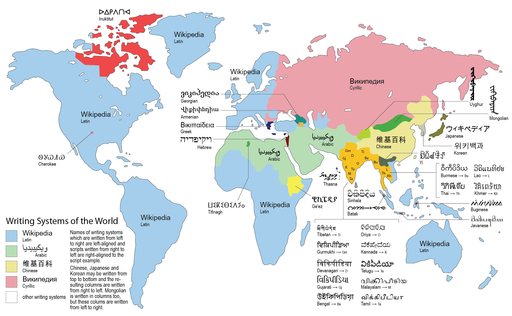Visual context for worldview in 40 maps: These visual treats will prompt lots of thinking and talking.
Share with others keen on understanding the world and its people.
http://asheepnomore.net/2013/12/29/40-maps-will-help-make-sense-world/
Writing Systems of the World is one example, below.
Wednesday, January 22, 2014
Monday, January 13, 2014
short articles & links to ponder or prompt discussions
as seen in the January 2014 newsletter from www.nextvistalearning.org
Teacher GC explains that words are built from both meaning and structure,
and the importance of history in knowing why words are what they are. http://www.youtube.com/watch?v=0mbuwZK0lr8
and the importance of history in knowing why words are what they are. http://www.youtube.com/watch?v=0mbuwZK0lr8
...Google maps tool for visualizing changes over time. A new site, Timelapse, takes that tool and identifies a number of the most interesting spots, as well as a field for choosing a new spot to examine. ...click on "Explore the World" at the lower right of the gray area, just before the paragraph describing the tool gets going. The Dubai one is fascinating - zoom out enough to see the palm-frond-looking extensions into the gulf. http://world.time.com/timelapse/
...comparisons and simple research on countries around the world using the World Data Atlas, a free app from the Chrome Web Store. The data choices include GDP, unemployment, birth, death, and fertility rates, and much more. You'll have to use Chrome as your browser to get it, of course. http://goo.gl/6pOYcP
This video (~14 minutes) is a promotional piece for the service organization Rotary International, and speaks of the dust storms from the Gobi Desert and the economic future of Mongolia. http://vimeo.com/21202577
Video by a girl telling about potatoes, sprouts, and chemicals that inhibit sprouts. It may well make you think about organic produce in a new way. http://www.youtube.com/watch?v=exBEFCiWyW0
About approaching historical levels of inequality that could breed violent class conflict. http://www.youtube.com/watch?v=QPKKQnijnsM
For those who advocate for really high standards of testing subjects in school, consider where author Robert A. Heinlein set the bar.
"A human being should be able to change a diaper, plan an invasion, butcher a hog, conn a ship, design a building, write a sonnet, balance accounts, build a wall, set a bone, comfort the dying, take orders, give orders, cooperate, act alone, solve equations, analyze a new problem, pitch manure, program a computer, cook a tasty meal, fight efficiently, die gallantly. Specialization is for insects."
Subscribe to:
Posts (Atom)
